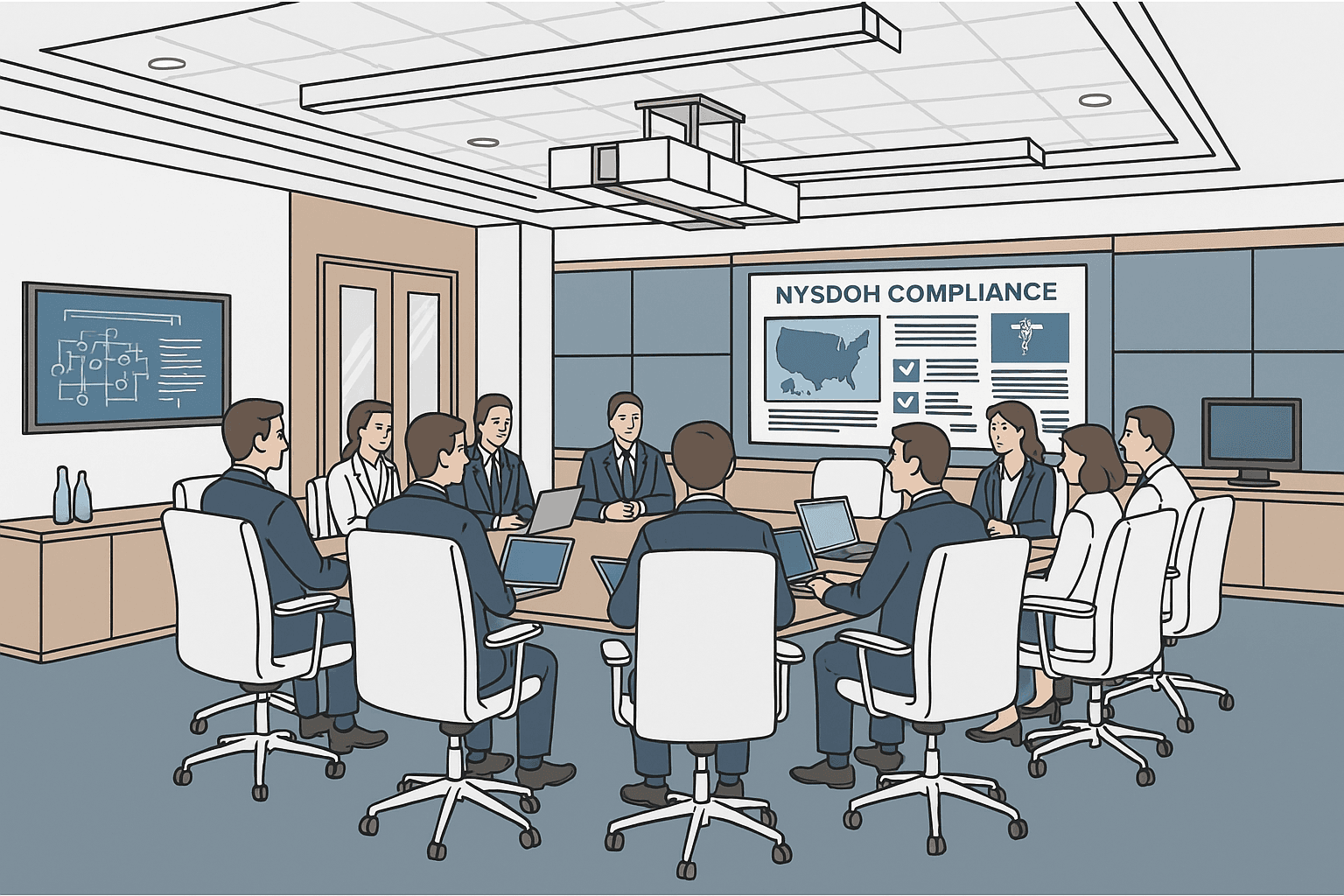New York State Hospital Cybersecurity
Regulation - Oct 2, 2025 Deadline
Comprehensive compliance guide for 10 NYCRR § 405.46
General hospitals must implement comprehensive cybersecurity programs by October 2, 2025, with incident reporting requirements effective October 2, 2024. This regulation extends beyond federal HIPAA requirements to protect patient data and ensure operational continuity.
Secure Your Hospital's Future
The October 2, 2025 compliance deadline is rapidly approaching. Ensure your hospital is fully prepared for New York’s stringent cybersecurity regulations, safeguarding patient data and operational continuity.
Connect with a Vilkas Consultant today for tailored strategies and expert guidance. Don’t risk non-compliance; proactive preparation is your best defense.

Essential Compliance Requirements
New York State's hospital cybersecurity regulation mandates a comprehensive approach to protecting patient information and hospital systems. These requirements establish a framework that goes beyond basic security measures to create a robust defense against evolving cyber threats.
7 Main Program Requirements
- Risk Assessment & Program Development: Conduct annual cybersecurity risk assessments covering all threats to nonpublic information (including PHI and PII). Establish a written cybersecurity program based on assessment findings to identify, protect, detect, respond to, and recover from cybersecurity events.
- Policies & Procedures Documentation: Maintain comprehensive written policies covering asset management, access controls, data governance, patient privacy, incident response, and disaster recovery. Review policies regularly and update to address emerging threats and changing risks.
- Leadership & Governance: Appoint a qualified Chief Information Security Officer (CISO) at the senior executive level. The CISO oversees the cybersecurity program implementation and provides annual reporting to the hospital’s governing body on security posture and incidents.
- Technical Controls & Testing: Perform annual automated vulnerability scans and penetration tests on all hospital information systems. Implement multifactor authentication for external network access and enforce strong identity and access management controls throughout the organization.
- Incident Response Plan: Develop documented procedures with clear roles, responsibilities, and escalation processes for responding to cybersecurity incidents, including ransomware attacks and data breaches. Plans must include communication protocols and recovery playbooks.
- Training & Monitoring: Provide continuous cybersecurity awareness training for all staff members. Maintain comprehensive monitoring and audit trails of relevant systems to detect unauthorized access and suspicious activities in near-real time.
- Third-Party Management: Ensure cybersecurity controls extend to all vendors and third-party service providers. Implement contractual requirements and ongoing assessments to verify partner compliance with security standards.
Additional Compliance Requirements
- Report any cybersecurity incident to NYSDOH within 72 hours of discovery.
- Maintain all documentation, audit trails, risk assessments, and incident reports for six years.
FAQ: NYSDOH Hospital Cyber Requirements
- Readiness assessment mapped to NYSDOH requirements.
- Testing plan (risk assessment, scans, penetration testing).
- IR tabletop facilitation and staff training.
- Board-ready reporting templates and CISO support.
- Vendor due-diligence playbooks and reviews.
The rules apply to all New York general hospitals by October 2, 2025. The 72-hour incident reporting requirement began on October 2, 2024.
Incidents that materially impact operations, involve ransomware, or compromise nonpublic information (e.g., PHI/PII) should be treated as reportable to NYSDOH within 72 hours of discovery.
- Risk management and governance.
- Protection of all nonpublic information (PII, PHI, business data).
- Vulnerability management and a penetration-testing cadence.
- Incident response procedures and six-year audit trail retention.
- Third-party/vendor access controls and reviews.
- Staff awareness and training with documented policies and procedures.
Perform annual risk assessments with ongoing vulnerability scanning. Penetration testing should follow a regular cadence aligned to your risk profile and system changes.
A qualified CISO oversees controls and delivers a formal annual report to the board covering program effectiveness, material risks, incidents, and remediation progress.
Maintain audit trails, risk assessments, incident reports, and related compliance documentation for at least six years.
Vendors with system or data access must meet strict controls and undergo regular due-diligence and compliance reviews (contractual requirements, evidence of controls, and remediation timelines).
Enforcement Consequences & Strategic Impact
Regulatory Penalties
New York State Department of Health enforcement actions carry significant financial and operational consequences. Understanding these penalties is crucial for hospital leadership when allocating cybersecurity resources and ensuring compliance priorities.
Financial Penalties
Civil penalties may reach several million dollars depending on violation severity, negligence level, and organizational size. Fines scale with the scope of non-compliance and potential patient impact.
Operational Mandates
NYSDOH may require formal corrective action plans with ongoing oversight, mandatory reporting, and third-party monitoring until compliance is achieved and sustained.
Licensure Risks
Repeat or serious non-compliance incidents may result in hospital license suspension or revocation, directly threatening operational continuity and patient care delivery.

Beyond Compliance: Strategic Imperative
These regulations represent more than regulatory checkbox items—they establish a critical operational mandate for protecting patient data and ensuring care continuity. Hospitals must view cybersecurity compliance as fundamental to their mission of providing safe, secure healthcare services.
Reputational Protection
Public enforcement actions and data breaches cause lasting damage to hospital reputation and erode patient trust, affecting long-term viability and community standing.
Operational Resilience
Robust cybersecurity programs ensure uninterrupted patient care delivery and protect against costly ransomware attacks that can shut down critical hospital systems.
Market Differentiation
Proactive compliance demonstrates organizational maturity and commitment to patient safety, creating competitive advantages in an increasingly security-conscious healthcare market.
Hospital leadership must treat 10 NYCRR § 405.46 as a transformative opportunity to strengthen cybersecurity posture, protect patient trust, and ensure sustainable operations in an evolving threat landscape.
Secure Your Hospital's Future
The October 2, 2025 compliance deadline is rapidly approaching. Ensure your hospital is fully prepared for New York’s stringent cybersecurity regulations, safeguarding patient data and operational continuity.
Connect with a Vilkas Consultant today for tailored strategies and expert guidance. Don’t risk non-compliance; proactive preparation is your best defense.

Quick Answers: Deadlines & Reporting
- Report any material cybersecurity incident to NYSDOH within 72 hours.
- Maintain all documentation, audit trails, risk assessments, and incident reports for six years.
- Financial penalties that scale with severity and impact.
- Operational mandates such as corrective action plans with oversight and ongoing reporting.
- Licensure risks including potential suspension or revocation for repeat/serious issues.
No. NYSDOH requirements go beyond federal HIPAA obligations. Hospitals must meet both.
A qualified CISO should lead implementation, monitoring, and the annual report to the governing body.
- Confirm vendor due-diligence and tighten contracts.
- Schedule risk assessments, scanning, and penetration testing.
- Run tabletop exercises and staff training; update policies and procedures.
- Establish board-level reporting for the CISO.